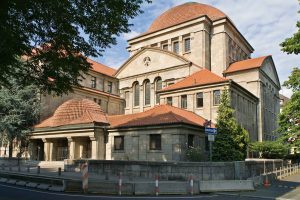Emigrant philosophers against Hitler during WW II
During WWII, the US Office of Strategic Services, predecessor of the CIA, enlisted the help of famous German emigrant philosophers like Marcuse, Kirchheimer et al. The protagonists of the Frankfurt School compiled intelligence reports on Nazi Germany, evaluating the social and political mood. Jewish Intelligence thus played a major role in developing Allied wartime strategy…
When Herbert Marcuse, one of the leading lights of the Frankfurt School, held a talk in Rome in 1968, he was interrupted constantly by Daniel Cohn-Bendit. The German-French student leader, who today is a Green Party politician, demanded that Marcuse give an accounting of his “scandalous past” as a CIA operative during the Second World War. This accusation was mistaken from start to finish. During the war, Marcuse had indeed worked for the US intelligence service. At the time, though, the agency was still called the Office of Strategic Services (OSS). More importantly, however, was the fact that the work carried out by Herbert Marcuse, together with his colleagues Otto Kirchheimer and Franz Neumann, was anything but reprehensible. From 1943 on, Marcuse and his two fellow Frankfurt School theorists worked as analysts, compiling intelligence reports on Nazi Germany, evaluating the social and political mood among the German people, and analyzing the leadership structures of the Nazi regime.
These analyses, originally published as the Secret Reports on Nazi Germany and now released in a German translation published by Campus Verlag, make for compelling reading. Marcuse and his fellow scholars analyzed material made available to them by the intelligence services. This material was derived from interrogations of prisoners of war, intercepted telephone conversations, war reports, newspaper articles, and official Nazi propaganda. The sociologists and philosophers of the Frankfurt School who had ended up in the US after fleeing Nazi Germany had an understandably vital interest in taking part in the battle against Hitler. In turn, their reports and analyses were taken very seriously by US intelligence authorities, and would go on to play an important role in the development of wartime strategy. After the war, Franz Neumann’s scholarship on universal law and morality also helped shape preparations for the charges filed at the Nuremberg Trials.
With only fragmentary information to work with, the reports compiled by the three analysts could not always fully capture the realities of Nazism – but they painted a surprisingly accurate picture. After Stalingrad, for example, they set out to examine whether the realization of inevitable defeat might present an opening within the regime’s leadership. Was it conceivable that the party leadership might consider removing Hitler from power and open the door to negotiations with the Soviet Union and the western Allies, in hopes of preserving the core of the Reich?
In a sense, the failed putsch of July 20, 1944 would ultimately lend support to that speculation. Although the German military was deeply implicated in the crimes of the regime, some elements within the military remained capable of oppositional thought and action.
The Frankfurt School analysts also closely observed how the subordination of the Home Army under the command of SS Chief Heinrich Himmler served to hold the “home front” together through the use of terror. And despite the rising sense of despair within Germany, the analysts cautioned against the hope that the regime could be toppled from within.
Indeed, until the bitter end, the German population would continue to mobilize all its resources in aid of a regime in which they had largely lost faith. This was in part because the regime had expertly stoked their fear of the Russians, but also because the entire German people knew they had become complicit in the crimes of the regime – a complicity for which they also knew they were unlikely to escape punishment. Ever perceptive, this, too, was accurately predicted by the Frankfurt analysts, even before the full dimensions of the crimes that had been committed against Jews had become known.
Herbert Marcuse, Otto Kirchheimer and Franz Neumann continued their work for the intelligence services even after the defeat of Nazi Germany, submitting their final report in 1949. Their postwar analyses focused mainly on the prospects for rebuilding Germany. Whenever possible, their postwar plans for democratic revival sought to sway Germany in the direction of democratic socialism – and in this, too, they remained entirely in keeping with the ideals of the Frankfurt School.

